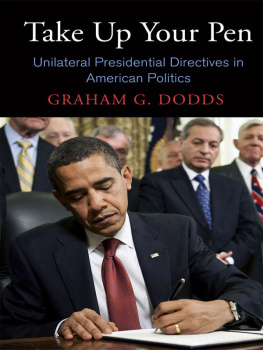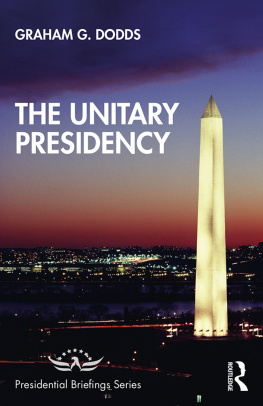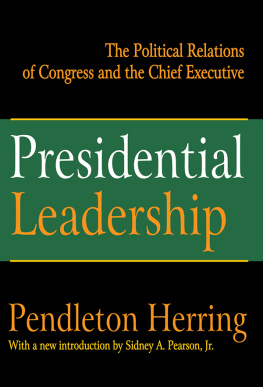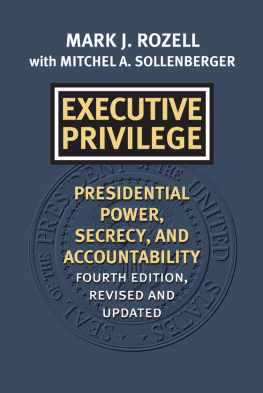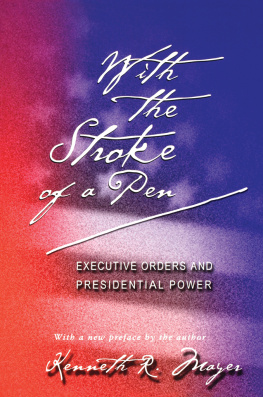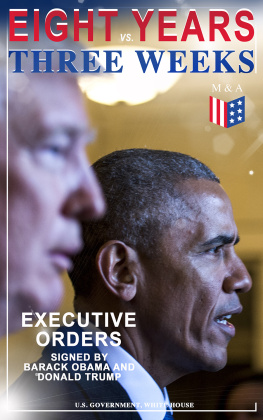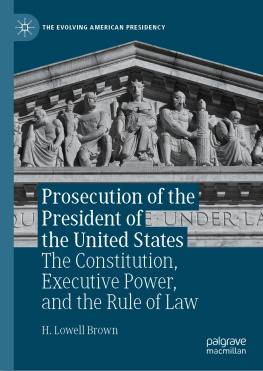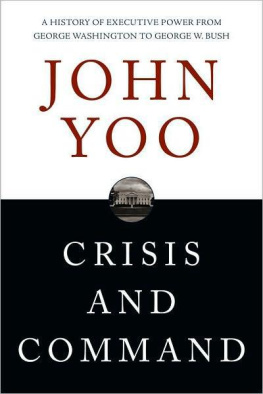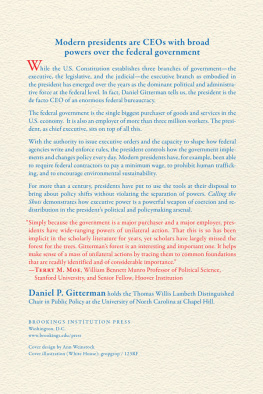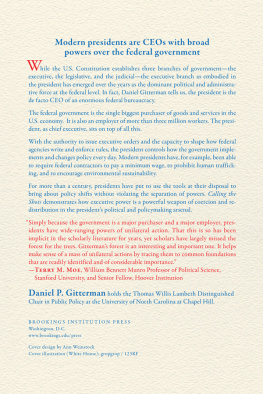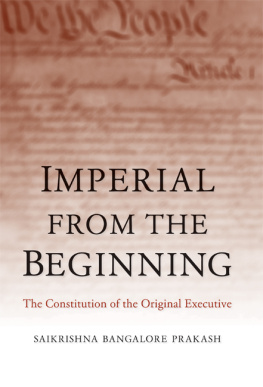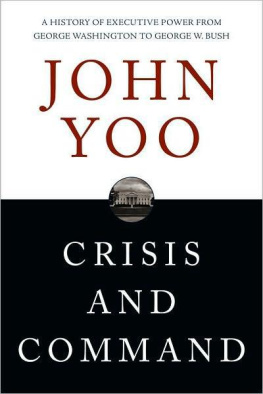CHAPTER ONE
Unilateral Directives and the Presidency
Stroke of the pen, law of the land. Kind of Cool.
Paul Begala, Advisor to President Clinton (1998)
The history of executive orders is, to a great extent, a narrative of the evolution of presidential power.
Robert B. Cash, Presidential Power (1963)
Outrageous, or Ordinary?
On December, 15, 2005, Americans were shocked to learn that President George W. Bush had issued an executive order directing the National Security Agency (NSA) to engage in domestic spying on U.S. citizens. Bush secretly issued the order in 2002 as part of the government's effort to prevent another terrorist attack on the scale of those committed on September 11, 2001. But Bush's policy appeared to contradict the legal processes established by the Foreign Intelligence Surveillance Act (FISA) of 1978 (Pub. L. 95511, 92 Stat. 1783), which required the government to obtain a warrant before engaging in domestic spying.
Public indignation at Bush's unilateral directive for domestic spying was immediate and widespread. A poll conducted a month after the public revelation showed that 51 percent of Americans opposed Bush's action and 58 percent supported the appointment of a special prosecutor to investigate the legality of the program.
Major newspapers also criticized Bush's action. In an editorial three days after its initial story, the New York Times described the program as illegal government spying and charged that Mr. Bush's team cannot be trusted to find the boundaries of the law, much less respect them.
In the halls of Congress, senators and representatives were outraged about Bush's spying directive. The day after the story broke, the Senate refused to reauthorize the Patriot Act, several senators demanded a joint inquiry by the Judiciary and Intelligence Committees, Senator Arlen Specter (then R-PA) threatened hearings, and Senator John Kerry (D-MA) said the president seemed to think he was above the law. Senator Russ Feingold (D-WI) sought to pass a resolution censuring the president for his action, and some members of Congress even spoke of possible impeachment.
Criticism of Bush's unilaterally imposed spying program even came from members of the Bush administration itself. On New Year's Day, 2006, the Times reported that in March 2004, the acting attorney general, James Comey, had determined that the domestic spying program was likely unconstitutional (even though it had been previously reauthorized by the Department of Justice), so he decided not to renew approval for it. For some critics, it was ironic that Ashcroft, the father of the Patriot Act, was belatedly assuming the mantle of protector of civil liberties and constitutional niceties, but it suggested that Bush's unilateral action had indeed gone too far.
Five months later, the judiciary also condemned Bush's order. In ACLU v. NSA, 438 F. Supp. 2d 754, E.D. Mich. (2006), Judge Anna Diggs Taylor ruled that Bush's action was unconstitutional. Her opinion admonished, There are no hereditary kings in America and no powers not created by the Constitution.
In short, Bush's policy was widely condemned by the public, the press, members of Congress from both political parties, the judiciary, and even officials within the administration. So what happened? Nothing. The public outcry dimmed, and Bush's executive order and policy remained in place.
Even when yet more damning details emerged, nothing changed. On May 11, 2006, USA Today revealed that the government was using information gleaned from domestic spying to compile a massive database, including tens of millions of phone calls made by customers of the nation's three largest telecommunications companies, in apparent violation not only of FISA and the Fourth Amendment but also of various statements and promises issued by officials in the Bush administration after the domestic spying program was exposed. But despite this revelation, the program continued. And some polls suggested that the American people had even come to embrace Bush's policy: a Washington Post poll conducted shortly after the database revelation found that 63 percent of respondents supported the NSA program and only 35 percent opposed it. Moreover, Congress acted to legitimate Bush's policy in 2007 (Pub. L. 11055, 121 Stat. 552) and again in 2008 (Pub. L. 110261, 122 Stat. 2436), giving legislative sanction to what had been the president's unilateral policy and granting the telecommunications companies immunity from lawsuits for violations of privacy.
Thus, even though the president's executive order initially elicited so much outrage, and even after more and more controversial details emerged, nothing changed, and it was quickly back to business as usual. It was almost as if controversial unilateral presidential policymaking itself were just business as usual, which is exactly what this book argues it is.
The Argument of the Book
The above episode is emblematic of a much broader puzzle in U.S. constitutional politics and interbranch relations, as presidents have often used unilateral directives such as executive orders and proclamations to impose controversial policies, and Congress and the courts have at times complained but have seldom offered much in the way of real resistance. This book seeks to explain how we got to this point and why it matters. The basic argument of the book may be summarized as follows.
In unilateral presidential directives, American political development has seen a major expansion of presidential power that rests on vague justifications and has been relatively unchecked. This book documents and explains this development. The explanation has roots in the Constitution's ambiguity and the character of executive power, which is inherently resistant to strict limits. But the rise of more activist central governance from the Progressive era onadvanced first by Theodore Roosevelt and then by a variety of successors, with congressional, judicial, and popular acquiescencehas led to more extensive governance by unilateral presidential directives. This state of affairs has strengths as well as weaknesses, but it is hard to reconcile with any but very thin conceptions of democracy. Whether Americans really want or need governance by unilateral presidential directives is a central question for American politics today and will be in the years ahead.
The ABCs of UPDs
Some basic background information about unilateral presidential directives (UPDs) may be useful as a foundation for the above argument. Public awareness of unilateral presidential directives has been growing over the last dozen years or so, sparked in part by Barack Obama's use of executive orders and presidential memoranda to reverse many of his predecessor's policies, by several controversial unilateral directives that George W. Bush promulgated for the war on terror and other matters, and by what critics regarded as an unprecedented rash of late-term executive orders by Bill Clinton. But the historical record is much richer than recent public attention: presidents have long relied on unilateral directives to enact their preferences across a wide range of policy areas. Every president has issued executive orders or similar directives. Even William Henry Harrison, who was president for only thirty-one days, issued a proclamation, calling Congress into a special session.

